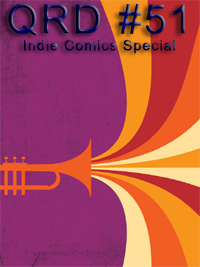
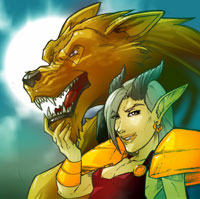
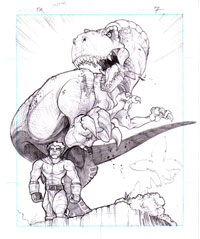
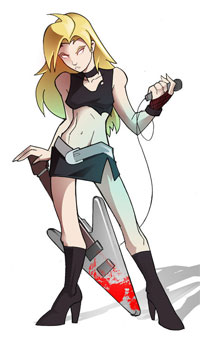
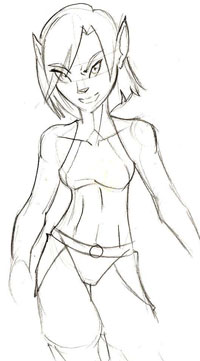
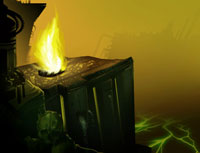
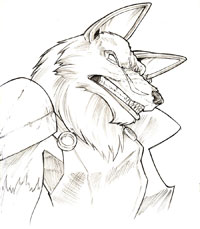





June 2011
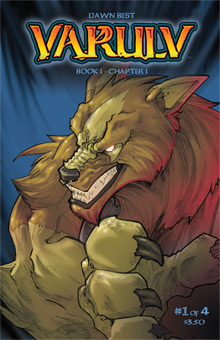
City: Columbus, Ohio
Comics: VARULV, Sonic the Hedgehog, Sylvanna
Websites: DawnBest.com, VARULV.com
QRD – How old were you when you first got into comics & did you always stick with them or did you come back to them?
Dawn – I was probably six or seven when I got introduced to comic books. It was the 80s & as kids we were all into Teenage Mutant Ninja Turtles. Some friends had gotten a hold of the comic books & I just remember thinking how weird the turtles all looked in those books versus what I saw on Saturday morning TV... I figured, since the style that the characters were rendered in was different, that these guys weren’t very good artists & anyone could therefore draw a comic book. I wanted to be an animator very badly back then, so I said comic books would surely be an easy thing to fall back on if that didn’t happen. I didn’t get seriously into comics until a few years later, after that...
QRD – What was the first comic book you ever bought?
Dawn – One of the Aliens Versus Predator books that were running regularly through Dark Horse at the time. My brother & I loved Aliens, Predator, & the Terminator because they were such badass beasties. Funny too, because about that time on the other end of the spectrum, I probably bought my first Sonic the Hedgehog book. Because really, what kid didn’t like Sonic?
QRD – How old were you when you put out your first comic?
Dawn – I did Sonic for Archie when I was 19. It took me about five seconds to move onto web comics thereafter & that’s when I did Sylvanna. Those were some hectic times, because I was finishing my last semesters of college as well, but I couldn’t fathom doing anything else when I graduated, so I was not complaining.
QRD – What decade do you think produced the best comics?
Dawn – I’m totally biased because it was my decade for getting into comics & will say the 90s.
QRD – Why comics instead of just writing or drawing?
Dawn – Why not all three? No seriously, I “just draw” too. I “just write.” But it’s funny because despite the incredible amount of effort it takes to both write & draw a complete story, I sometimes think of comics as cheating, when it comes to myself personally producing a quality product... What I mean by that is, I feel I write well, but I can better express myself if there’s a drawing I did accompanying my writing. I think I’m a good visual artist, but I don’t always walk away happy with single pin-up pieces that are meant to, in one shot, convey a broad concept. I don’t like doing cover art because I never have enough room. I don’t always like writing because I’m so long-winded & a horrible editor besides.
QRD – Do you see mini-comics & indie comics as paths to mainstream comics or as their own unique media?
Dawn – It’s funny to me because I worked backwards. My breakout book was one of the most popular in the country at the time. But practice always makes perfect, so I could argue that my starting block ? Archie Comics, where I learned everything about this art form, helped me get confidence in my ability to come up with my own ideas & retain complete control over them. I think you have to look at what you want to get out of your art ? what you want to get out of a story that you want to tell. If it’s money; okay, that’s everybody & have fun with that. If it’s fame, ditto. If it’s just to tell a good story & hopefully get a few people to find it as engaging as you do when creating it, you’ve got something. I think both indy & mainstream books, the best ones, follow that ideal.
QRD – How many copies of your comic do you print in your first run?
Dawn – One-hundred is pretty standard for
me. I also offer them online, both in print & downloads ? so what
I print is usually just for me to lug around to some convention or whatnot.
QRD – How much do you think comics should
cost?
Dawn – I don’t think cost should be based on quality of work, but again what you want out of the experience of writing & drawing your book. If money, then $500 a piece is fair. I mean, someone’s bound to buy one, just to see why the price is so high. If recognition is your aim, then I suggest throwing a tickertape parade & tossing the books around for free like confetti. I think either way, you have to take your marketing as seriously as you take your book creation. Stop & think if you set your price above that of a mainstream book, if you’d be comfortable losing a portion of your audience who didn’t have that kind of dough to spend, for a select group who pays well & might suggest the book to other customers able to afford it. If you have a low price or are using the books as giveaways, then understand you might have a ton of people interested, but none of them paying to see your work ? at least, not right away. In both cases, there is never a guarantee that anyone will pick up your book to begin with. You should set your price not based on how great you perceive your stuff to be, but on how well you’d think it would stack-up against something next to it. In my experience, shooting high is better than shooting low.
QRD – How many books do you produce a year & how many would you like to?
Dawn – It weirds me out but with VARULV I’ve realized, even with significant breaks in production, I’m fully capable of finishing these 20-page black & white books in under a month’s time. So, I guess I’m capable of 12. I don’t think I need to do more than that, certainly. Plenty of breathing room in there, which is important to avoid burnout.
QRD – Do you think stories should be serialized or delivered as complete works?
Dawn – I think you need to have a complete story ready before you go serial. I’m a fiend for epic, sweeping stories, but they simply must have an ending of some kind. If you manage to put out a good read, light on the continuity on a monthly basis that always comes to a conclusion, then that’s fine, but don’t tantalize people with loose ends that never get tied up. It comes off as unprofessional & just plain disappointing. I almost think there was a time when this was okay, in comics... but that’s no longer the case.
QRD – How are comic strips different than comic books & which medium do you prefer?
Dawn – Comic strips I enjoy very much when they’re done well. The misconception is that they take less time, when that’s not always the case. Not just updating (period) is important, but consistency in when, how, & where you update is too. I’m more free-form, or at least, I trick my brain into thinking it doesn’t need to finish a book in a certain amount of time & I become way more productive & happy with the work I produce. I couldn’t do comic strips, because even if I got ahead, I’d feel under pressure to create on a whim & work under some form of pressure.
QRD – How long is it from when you start a comic until it’s printed?
Dawn – Six weeks. I finish the work on the book in three weeks, that generally assure the prints are ready a month later. The company I work with (Ka-Blam!) is almost always ahead of schedule.
QRD – What do you do better with your comics now than when you first started?
Dawn – Oh lordy, everything. I write much better. I write smarter. Obviously, my penciling ability has only gotten better, too. We’re talking ten years here, so I’d be disappointed if I hadn’t improved in one spot or the other significantly, & I totally have.
QRD – At what point in the artistic process do you work digitally?
Dawn – After the pencils are finished, they’re scanned & into Photoshop they go for level adjustment, toning (or coloring, depending on what it is) & lettering. I rarely ink these days because I have worked on clean pencils so much & only intend to continue. It’s something I think I could come close to perfecting & might even be known for, in the future.
QRD – What do you think of digital comics & webcomics?
Dawn – I love them, I live by them, & think while printed copies are preferred, you sell yourself short by not offering at least some of your work, digital.
QRD – Do you prefer working in color or black & white?
Dawn – Black & white. I’m too lazy to color. Haha ? actually, I love to work in both, but black & white showcases my pencils really well & I’ve yet to convince myself I absolutely have to move into colored pages in the future. I’d frankly rather get books out on time than have people waiting for me because I’m taking forever to color something.
QRD – How many different people should work on a comic & what should their jobs be?
Dawn – I can’t answer that one. I like working on my own, art, story, script, letters... But that’s because I’m a control freak, & certainly not because I have a ton of time to do it all.
QRD – How do you find collaborators?
Dawn – I ask myself “who could seriously stand to work with me?” & then I give up.
QRD – How tight do you think a script should be as far as telling the artist what to draw?
Dawn – I’ve worked both ways ? I’ve penciled from detailed, Watchmen-esque storylines that the writer has written out to include every detail of every aspect of every corner of every panel... to the Stan Lee “the main character beats up the bad guy & has a revelation about something” kind of script. I work more along the lines of the latter & find that I come up with some really neat stuff the more open-ended & basic the concept is, but if I’m collaborating (see above answer, by the way) I don’t mind either type of writer.
QRD – What comic book person would you be most flattered to be compared to?
Dawn – Joe Kubert, Will Eisner, Stan... To not just be known for the kind of work I produce, but the way in which I do it & the legacies I leave behind because of it. That would really get me off.
QRD – What do your friends & family think of your comics?
Dawn – I get nothing but support & encouragement from my friends & family. Most of the time I don’t tell them I’m doing something because I don’t like to share something until it’s finished & I know they can sometimes get more excited than I do. I’m lucky, very lucky, in that way.
QRD – What do you think of superheroes?
Dawn – Love ‘em. Want to be one. Who doesn’t?
QRD – Marvel or DC?
Dawn – I’m a Marvel.
QRD – What comic characters other than your own would you like to work with?
Dawn – Dethklok. & by that I mean, I’d like to work with the actual fictional band, more so than a comic book about them.
QRD – Ideally would you self-publish?
Dawn – For now, yes. That control thing again. When I have a big chunk of the beginning of VARULV finished, I’d like to take maybe the first compilation book, where all the big stuff’s been established (as has my work ethic for it, let’s be honest) & see who bites...
QRD – What conventions do you try to attend & why?
Dawn – I tend to get lots of the East Coast shows. I prefer smaller shows ? I’ve done San Diego, Wizard & those, & feel always in good company, but a little lost.
QRD – What do you do to promote your books?
Dawn – Mostly web-stuff. Websites, Facebook & all that are important (& free) places to do marketing.
QRD – Do you think your comics are well suited to comic shops or would sell better elsewhere?
Dawn – It’d be hard to see comic shops fade away. They’re no longer creepy dungeons frequented only by pimply mouth breathers, after all. The comic shop of today is less intimidating than yesterday & has really become more of an inviting geek wonderland. The books are only part of the reason I visit my local shop, every month.
QRD – What other medium would you like to see some of your comics made into (television, film, games, action figures, etc.)?
Dawn – How about all of the above?
QRD – Do you consider yourself a comic collector or a comic reader or both?
Dawn – I’m a reader, for sure. I love getting those compilation volumes, though. I see no problem spending money on a hardcover Marvel collection or art book, & yet I always opt for softcovers on novels ? even the ones I really like.
QRD – What do you see as the most viable mediums for comics distribution 10 years from now?
Dawn – Smartphones have been a great way to pick up comics, lately. There’s that whole digital thing again I know, but really the smartphone makes comics so easy to get a hold of ? the same way the iPod & iTunes store made music available for people on the go. Even if you go out & buy the paperback later on (which by the way I think there still will be paperbacks in ten years) or you already own it, you can’t tell me you haven’t ever sat in a crowded bus station wishing you had the latest issue of whatever handy.
QRD – What would you like to see more people doing with comics?
Dawn – There’s no reason that anyone who has the desire & time to commit to producing a book, can’t produce a book these days. If anything, I want to see more books on the indy market. From everyone.
QRD – Anything else?
Dawn – My cat would like to type something
now:
DW*HS*HHHHHHHHHHHHHHHHHHHHHHHHHHHHHH







